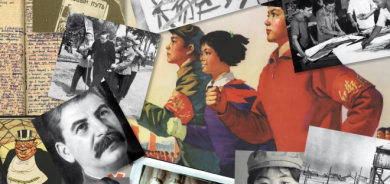On Wednesday, a group of more than 250 academics voiced their concerns that Sweden’s Living History Forum was being used as a tool to further a specific political agenda.
The piece, published on the debate pages of Dagens Nyheter (DN), prompted a quick response from Minister of Education Jan Björklund, who earlier in the week had announced a plan to make history a compulsory subject in Swedish high schools.
Several of Sweden’s major papers also registered their opinion on whether the Forum, a state-run agency, is worth keeping and if so, how it should be run.
The Göteborgs-Posten (GP) newspaper starts by asking why examining the terror of communism has stirred controversy in a way that examining the terror of the Nazis has not. The paper believes the answer lies in part with how close each is to the present.
“Nazism is dead,” writes the paper.
“Those Swedish researchers who had a past of youthful indiscretion in the Nazi movement are too. But communism isn’t dead. The terror continues. And at Swedish universities there are more than a few researchers who, in student days gone by, waved Mao’s Little Red Book and confidently explained that if you want to make an omelet, first you must break a few eggs.”
GP continues by pointing out that “historians always see the past through the eyes of the present” and that even Swedish primary school students have learned that “modern Sweden’s history is that of social democracy–a considerable simplification and ideological clarification”.
The paper concludes, however, that the Forum is a worthwhile project.
“In the best case scenario, it will lead to better history lessons and more self-critical researchers.”
For its part, the Sydsvenskan newspaper agrees with the historians’ argument that it’s not the government’s or the state’s job to “replace ordinary history lessons with campaign history and to prescribe in great detail how history should be interpreted and used.”
However, the paper accuses the historians of being a bit biased themselves in their interpretation of the Forum’s mission.
The paper reminds readers that the Forum came from a 1997 initiative spearheaded by former Prime Minister Göran Persson to “promote work with democracy, tolerance, and human rights, taking the Holocaust as a starting point.”
The effort transformed into a state agency in 2003 and since then the Forum has looked at questions such as homophobia, anti-Semitism, and Islamophobia before taking up “communism’s crimes against humanity” in December of 2006 at the behest of the then newly elected centre-right government.
“An activity which had been ongoing for several years without meeting any serious criticism was suddenly called into question. That is hardly a coincidence,” writes Sydsvenskan.
The paper asserts that connecting communist ideology with the genocidal practices of specific communist regimes is controversial in a way that the evils of Nazism are not.
It points to statistics showing that 90 percent of Swedish school children don’t know what the Gulag is, calling the findings “a frightening lack of historical knowledge”, but arguing that the problem is better addressed by schools than by a government agency.
“Good lessons in history do more to keep history living than an agency for living history,” Sydsvenskan concludes.
Similary, Svenska Dagbladet (SvD) recites Björklund’s assertion that schools ought to take responsibility for “enlightening” students about history rather than a state agency. The paper then goes further by calling flat out for the Forum to be shut down and replaced by an independent foundation.
While DN columnist Henrik Berggren agrees that an independent foundation would have been the best option for the Forum from the start, he believes that making the change now might not be so easy.
He first explains that the Forum was flawed from the start.
“The starting point was an alarming poll result which showed Swedish youths’ lack of knowledge about the Nazi genocide which was seen as requiring an immediate response. But knee-jerk reactions when it comes to questions of knowledge seldom succeed,” he writes.
Not only was the Forum hastily conceived, argues Berggren, it then became a state agency with a mission subject to the whims of whichever government is in power.
“Now we’re stuck between a rock and a hard place,” writes Berggren.
“If the Forum remains in its current form, then it legitimizes the political control of the teaching of history. If the state withdraws the commission, it becomes a bizarre sort of admission that the victims of communist terror aren’t as deserving of the same attention as those of the Nazis.”



 Please whitelist us to continue reading.
Please whitelist us to continue reading.